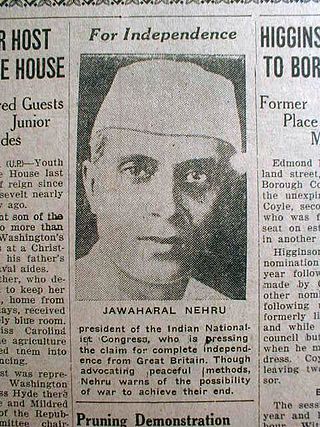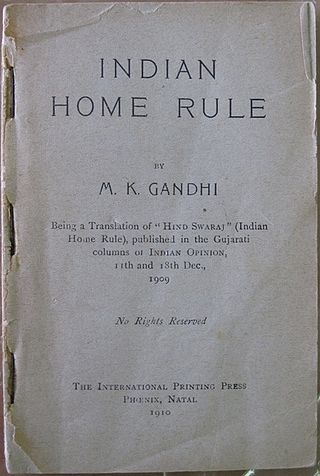
Mohandas Karamchand Gandhi was an Indian lawyer, anti-colonial nationalist and political ethicist who employed nonviolent resistance to lead the successful campaign for India's independence from British rule. He inspired movements for civil rights and freedom across the world. The honorific Mahātmā, first applied to him in South Africa in 1914, is now used throughout the world.

The Kingdom of God Is Within You is a non-fiction book written by Leo Tolstoy. A Christian anarchist philosophical treatise, the book was first published in Germany in 1894 after being banned in his home country of Russia. It is the culmination of 30 years of Tolstoy's thinking, and lays out a new organization for society based on an interpretation of Christianity focusing on universal love.

Swarāj can mean generally self-governance or "self-rule". It was first used by Chhatrapati Shivaji Maharaj to attain self rule from the Mughal Empire and the Adil Shahi and Nizam Shahi Sultanates. Later, the term was used synonymously with "home-rule" by Maharishi Dayanand Saraswati and later on by Mahatma Gandhi, but the word usually refers to Gandhi's concept of Indian independence from foreign domination. Swaraj lays stress on governance, not by a hierarchical government, but by self-governance through individuals and community building. The focus is on political decentralisation. Since this is against the political and social systems followed by Britain, Gandhi's concept of Swaraj advocated India's discarding British political, economic, bureaucratic, legal, military, and educational institutions. S. Satyamurti, Chittaranjan Das and Motilal Nehru were among a contrasting group of Swarajists who laid the foundation for parliamentary democracy in India.

Gandhism is a body of ideas that describes the inspiration, vision, and the life work of Mohandas K. Gandhi. It is particularly associated with his contributions to the idea of nonviolent resistance, sometimes also called civil resistance.
"A Letter to a Hindu" was a letter written by Leo Tolstoy to Tarak Nath Das on 14 December 1908. The letter was written in response to two letters sent by Das, seeking support from the Russian author and thinker for India's independence from colonial rule. The letter was published in the Indian newspaper Free Hindustan. The letter caused the young Mohandas Karamchand Gandhi to write to Tolstoy to ask for advice and for permission to reprint the Letter in Gandhi's own South African newspaper, Indian Opinion, in 1909. Gandhi was living in South Africa at the time and just beginning his activist career. He then translated the letter himself, from the original English copy sent to India, into his native Gujarati.

Freeman Freeman-Thomas, 1st Marquess of Willingdon, styled as the Earl of Willingdon between 1931 and 1936, was a British Liberal politician and administrator who served as Governor General of Canada and as Viceroy and Governor-General of India.

The Declaration of Purna Swaraj was a resolution which was passed in 1930 because of the dissatisfaction among the Indian masses regarding the British offer of Dominion status to India. The word Purna Swaraj was derived from Sanskrit पूर्ण (Pūrṇa) 'Complete', and स्वराज 'Self-rule or Sovereignty', or Declaration of the Independence of India, it was promulgated by the Indian National Congress, resolving the Congress and Indian nationalists to fight for Purna Swaraj, or complete self-rule/total independence from the British rule
"Raghupati Raghava Raja Ram" is a bhajan widely popularised by Mahatma Gandhi and set to tune by Vishnu Digambar Paluskar in Raga Mishra Gara.
Geoffrey Nielsen Ostergaard was a British political scientist best known for his work on the connections between Gandhism and anarchism, on the British co-operative movement, and on syndicalism and workers' control. His books included The Gentle Anarchists: A Study of the Sarvodaya Movement for Non-Violent Revolution in India (1971), coauthored with Melville Currell, and Nonviolent Revolution in India (1985), both dealing with the Sarvodaya movement. He spent the majority of his academic career at the University of Birmingham.

The Quit India speech was given by Mahatma Gandhi on the eve of the Quit India movement, August 8, 1942. His address was issued shortly before midnight at the Gowalia Tank Maidan park in Bombay, which has since been renamed August Kranti Maidan.
Seven Social Sins is a list by Frederick Lewis Donaldson that Mohandas Karamchand Gandhi published in his weekly newspaper Young India on October 22, 1925. Later he gave this same list to his grandson, Arun Gandhi, written on a piece of paper on their final day together shortly before his assassination. The Seven Sins are:
- Wealth without work.
- Pleasure without conscience.
- Knowledge without character.
- Commerce without morality.
- Science without humanity.
- Religion without sacrifice.
- Politics without principle.

Gandhi: Behind the Mask of Divinity is a book by United States Army officer G. B. Singh. The book was written in biographical form nearly 60 years after the assassination of Mohandas Karamchand Gandhi, and challenges his image as a saintly, benevolent, and pacifistic leader of Indian independence, told through Gandhi's own writings and actions over the course of his life. The book claims that Gandhi emulated racism from the Hindu ideology of caste towards the blacks of South Africa and the Untouchables, instigated ethnic hatred against foreign communities, and, to this end, was involved in covering up the killing of American engineer William Francis Doherty.

Hind Swaraj or Indian Home Rule is a book written by Mohandas K. Gandhi in 1909. In it he expresses his views on Swaraj, modern civilization, mechanisation, among other matters. In the book, Gandhi repudiates European civilization while expressing loyalty to higher ideals of empire. The book was banned in 1910 by the British government in India as a seditious text.
Robin Bannerman Jeffrey is a Canadian-born professor. His primary research interest is the modern history and politics of India, especially with reference the northern area of Punjab and Kerala in the south. He is also interested in Indian media studies and development studies.

Apostolos Serletis is a Greek economist who is a professor of Economics at the University of Calgary.
Antony R. H. Copley was a British historian. He was an honorary professor at the University of Kent at Canterbury, and specialised in nineteenth century French history and modern Indian history.

A bronze statue of Mahatma Gandhi by Fredda Brilliant was unveiled in 1968 at the centre of Tavistock Square in London, to mark the impending centenary of Gandhi's birth in 1869. Mahatma Gandhi had studied law at University College London nearby from 1888 to 1891, before being called to the bar at the Inner Temple.

Henry Salomon Leon Polak was a British-born lawyer, journalist and activist in South Africa who worked in collaboration with Mohandas Gandhi against racial discrimination. He served as an editor for the journal Indian Opinion and influenced by Theosophy, he believed in humanism and worked for the British Indian Association and several other causes.












